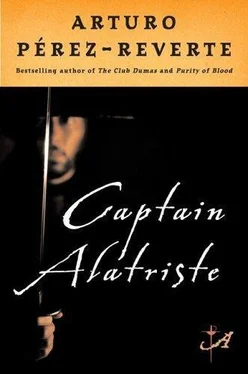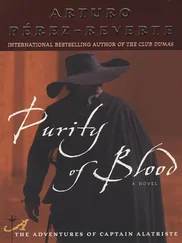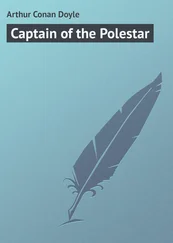Arturo Perez-Reverte - Captain Alatriste
Здесь есть возможность читать онлайн «Arturo Perez-Reverte - Captain Alatriste» весь текст электронной книги совершенно бесплатно (целиком полную версию без сокращений). В некоторых случаях можно слушать аудио, скачать через торрент в формате fb2 и присутствует краткое содержание. Жанр: Старинная литература, на английском языке. Описание произведения, (предисловие) а так же отзывы посетителей доступны на портале библиотеки ЛибКат.
- Название:Captain Alatriste
- Автор:
- Жанр:
- Год:неизвестен
- ISBN:нет данных
- Рейтинг книги:3 / 5. Голосов: 1
-
Избранное:Добавить в избранное
- Отзывы:
-
Ваша оценка:
- 60
- 1
- 2
- 3
- 4
- 5
Captain Alatriste: краткое содержание, описание и аннотация
Предлагаем к чтению аннотацию, описание, краткое содержание или предисловие (зависит от того, что написал сам автор книги «Captain Alatriste»). Если вы не нашли необходимую информацию о книге — напишите в комментариях, мы постараемся отыскать её.
Captain Alatriste — читать онлайн бесплатно полную книгу (весь текст) целиком
Ниже представлен текст книги, разбитый по страницам. Система сохранения места последней прочитанной страницы, позволяет с удобством читать онлайн бесплатно книгу «Captain Alatriste», без необходимости каждый раз заново искать на чём Вы остановились. Поставьте закладку, и сможете в любой момент перейти на страницу, на которой закончили чтение.
Интервал:
Закладка:
At any rate, although the war against Holland and in the rest of Europe was the topic of conversation those days, I rarely heard the captain refer to his life as a soldier. That made me admire him even more, accustomed as I was to crossing paths with a hundred swaggering braggarts who, talking out of both sides of their mouth and fantasizing about Flanders, spent the day trumpeting their supposed feats at full pitch, clanking their swords through the Puerta del Sol or along Calle Montera, and strutting like peacocks on the steps of San Felipe. Their sashes were stuffed with tin tubes filled with documents praising their campaigns and their bravery, all of them ringing falser than a lead doubloon.
It had rained a little, early that morning, and there were muddy tracks on the tavern floor, and that smell of dampness and sawdust that public places get on rainy days. The clouds were breaking, and a ray of sun, timid at first but soon after very sure of itself, framed the table where Diego Alatriste, Licenciado Calzas, Domine Perez, and Juan Vicuna were chatting after a meal. I was sitting on a tabo-ret near the door, practicing my penmanship with a quill, an inkwell, and a ream of paper the licenciado had brought me at the captain's suggestion. "So he will be able to instruct himself and read law and bleed the last maravedis out of clients, like all you lawyers, scribes, and other bloodsucking varlets."
Calzas had burst out laughing. He was a pleasant fellow with a kind of cynical good humor, and his friendship with Alatriste was old and trusting. . "My faith! What a great truth that is," he had replied, still amused, and winking at me. "The pen, Inigo, is a better source of income than the sword."
"Longa manus calami, " the good father put it.
A principle about which all those gathered around the table were in agreement, either in cordial accord or to hide that they did not know Latin. The next day the licenciado brought me a gift of writing materials, which no doubt he had skillfully extracted from the courts, where, thanks to the corrupt practices of his office, he earned an easy livelihood. Alatriste said nothing, and he did not offer me counsel on what use to make of the pen, paper, and ink. But I read the approval in his calm eyes when he saw me sitting beside the door practicing my letters. I did that by copying a few of Lope's verses I had sometimes heard the captain recite on nights when the Fleurus wound tormented him more than usual.
The bastard has not come, as planned,
Whose design it was on this fair day.
To die by my genteel and noble hand
And, in so doing, gain cachet.
The fact that the captain would occasionally laugh quietly as he recited those lines, perhaps to gloss over the pain of his old wound, was not enough to cloud the fact that I longed for pretty verses. Like others I applied myself to copying that morning, having heard them also during the captain's long, sleepless nights.
Hand to hand I must duel with him
Where all Seville may see,
In the plaza or in the lane;
For he who kills with treachery
Will ne ’ er outlive the shame,
And he whose blood is vilely spilled
Gains more than him by whom he's killed.
I had just finished writing the last line when the captain, who had gotten up to get a drink from the water jug, took my paper to look it over. Standing beside me, he read the verses to himself and then fixed his eyes on me: one of those gazes I knew so well, serene and prolonged, as eloquent as the words I grew used to reading on his lips though they were never voiced. I remember that the sun, still an I-want-to-but-I-can't between the roof tiles of Calle Toledo, aimed an oblique ray at the rest of the pages in my lap, as well as the captain's gray-green, almost transparent eyes, and dried the last of the fresh ink of the verses Diego Alatriste held in his hand. He did not smile, or make a single gesture. Without a word he handed me the sheet of paper and went back to the table, but from there he sent me a last long look before again joining in conversation with his friends.
Then, only a brief interval apart, came El Tuerto Fadrique, his one eye a little red, and Don Francisco de Quevedo. Fadrique had come straight from his apothecary shop at the Puerta Cerrada; he had been preparing specifics for ailing clients, and his gullet was burning from the effects of vapors, elixirs, and medicinal powders. Thus the minute he walked in the door, he wrapped an arm around a large bottle of Valdemoro wine and began to detail to Domine Perez the laxative properties of the hull of a black nut from Hindustan. That was the scene when Don Francisco de Quevedo stepped inside, scraping the mud from his shoes.
"The mud that serves me, counsels me"
He was reciting as he entered, and clearly feeling fractious. He stopped at my side, adjusted his spectacles, glanced over the verses I was copying down, and raised his eyebrows, pleased to find that they were not lines from Alarcon or Gongora. Then he limped over to the table, with that gait demanded by his twisted feet—he had hobbled since he was a boy, something that had not gotten in the way of his being an agile and skillful swordsman—to sit down with the rest of his companions. And there he grabbed the closest jug.
"Share. Be not miserly with me,
But pour divine Bacchus's bounty. ..."
He directed this appeal toward Juan Vicuna. As I have said, Vicuna, who was very strong and brawny, had been a sergeant in the horse guard, had lost his right arm at Nieuwpoort, and now lived on his pension, which consisted of a license to run a small gaming house. Vicuna passed him a jug of Valdemoro, and although Don Francisco preferred the white from Valdeiglesias, he emptied it without taking a breath.
"What news of your petition?" Vicuna asked with interest.
The poet swiped his mouth with the back of his hand. A few drops of wine had fallen on the cross of Santiago embroidered on the breast of his black sleeved doublet.
"I believe," he said, "that Philip the Great is wiping his ass with it."
"That itself is an honor," Licenciado Calzas argued.
Don Francisco appropriated another jug.
"In that case"—there was a pause as he drank—"the honor is to his royal ass. The paper was good, a half-ducat a ream. And I wrote it in my best hand."
He was in a foul mood, for these were not good times for him, not for his prose or his poetry, or his finances. Only a few weeks earlier, the fourth Philip had had to lift the decree—first prison and then exile—that had been weighing over Quevedo since the fall from favor, two or three years before, of his friend and protector the Duque de Osuna. At last reinstated, Don Francisco had been able to return to Madrid, but he was in a monetary fast. His petition to the king, soliciting his former pension of four hundred escudos owed for service in Italy—he had been a spy in Venice, a fugitive, and two of his companions had been executed—had been answered with silence. That had made him more furious than ever, and his fury nourished his bad humor and his wit, which went hand in hand . . . and contributed to new problems.
"Patientia lenietur princeps, " Domine Perez said, consoling him. "Patience placates the sovereign."
"Well, Reverend Father, it does not placate me one whit."
The Jesuit looked around with a preoccupied air. Every time one of this group found himself in difficulty, it fell to the domine to speak to his character and his conduct, as befitted his position as man of the Church. From time to time, he absolved his friends sub conditioner without their requesting it. Behind their backs, the captain said. Less devious than the norm among members of his order, the domine took seriously the honored obligation to moderate squabbles. He was full of life, a good theologian, tolerant of human weaknesses, benevolent, and placid in the extreme. He made generous allowances for his fellow beings, and his church was crowded with women who came to confess their sins, drawn by his reputation for being generous at the tribunal of penitence.
Читать дальшеИнтервал:
Закладка:
Похожие книги на «Captain Alatriste»
Представляем Вашему вниманию похожие книги на «Captain Alatriste» списком для выбора. Мы отобрали схожую по названию и смыслу литературу в надежде предоставить читателям больше вариантов отыскать новые, интересные, ещё непрочитанные произведения.
Обсуждение, отзывы о книге «Captain Alatriste» и просто собственные мнения читателей. Оставьте ваши комментарии, напишите, что Вы думаете о произведении, его смысле или главных героях. Укажите что конкретно понравилось, а что нет, и почему Вы так считаете.










